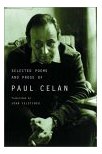|
Contents » Cover |
||
|
Essays
I began thinking about this little review with Arvo Pärt's Fratres in the CD player. Although Pärt's music is born of his Russian Orthodoxy and this piece came in the years after Celan's 1970 suicide, I feel the same sacred sense of silence, space, and devotion to language that one finds in Celan's work. Both work in agencies of extreme where humanity's loss wrought by oppressive regimes elevates death to martyrdom and martyrdom to saintly art. It's difficult to read Celan; not just because of his ripped syntax and the strain that so permeates the poems. There is always the defying urgency that refuses defeat under so much hate and death: "I stabbed out at death with my dagger . . . / and charged straight ahead at the ruins of heaven." There is always tender grief that stills the lungs forcing one to gratefulness for the ease in which most of us live: "Aspen tree your leaves glance white into the dark. / My mother's hair never turned white." There is always the rage that sets in when one realizes that the Holocaust which birthed Celan, the greatest Post-War European poet, was not the end of evil from empire builders, nor the subtle ways in which they find to invade the privacy of its peoples or the sovereignty of others. One hopes that works such as Celan's will slow and eventually still such greed that makes "the urns of stillness . . . empty." He is a poignant reminder for our own time. John Felstiner's highly praised translations bring to life Celan's story. Born in 1920 to German-speaking Jews in the farthest eastern outpost of the Austrian empire, Celan loses his parents to the Nazis at the age of twelve and thus begins the wonderings and writings, even then, that eventually lead to Paris where he lived out most of his life. There he continued writing some of the most heartbreaking, dark, and hopeful poetry of our time. His work makes our current obsession with psycho-babbling self-confession meager and pointless and the fashion for the highly wrought lyric a farce. He imagines his mother's execution in the snow, weaving a black shawl to protect her: "Autumn bled all away, Mother, snow burned me through: / I sought out my heart so it might weep, I found—oh the summer's breath, / it was like you. / Then came my tears. I wove the shawl." The poems fill with the words of emptiness and death: no, night, shadow, longing, blood, dream, snow, silence. Despite this he retains a burned belief in some greater force: "Near are we, Lord, near and graspable. // Grasped already, Lord, clawed into each other, as if / each of our bodies were / your body, Lord." Words fill so much with meaning and hope that he begins to collage new ones evoking new constructs of self and universe—star-overflown, speech-grille, latewood, late-noise, heartwall, hearttime—as he pleads and endures: "Speak— / But don't split off No from Yes. / Give your say this meaning too: give it the shadow." These are the poems that Rilke would have written if he had suffered less internally, less egocentrically. Each opened a gate to the soul's fields. Celan sweat blood. Rilke sweat dew. If Rilke was the first modernist poet through his calling out to angels, then Celan found the word patterns that first described our fragmented New World. His poems become progressively dense, more fervently abstracted, and yet always he retains a human simplicity of voice: "A Nothing / we were, are now, and ever / shall be, blooming: / the Nothing-, the / No-One's-Rose." Celan's poetry stands as a testament to the human will to stamp out darkness even as, with suicidal him and murdered parents; he carries it to the grave:
WHAT HAPPENED? The stone stepped from the mountain. Upon receiving the Bremem literature prize Celan said:
For a poem is not timeless. Certainly it lays claim to infinity, it seeks to reach through time—through it, not above and beyond it. A poem as a manifestation of language and thus essentially dialogue, can be a message in a bottle, sent out in the—not always hopeful—belief that somewhere and sometime it could wash up on land, on heartland perhaps. Poems in this sense too are underway: they are making toward something. Toward what? Toward something standing open, occupiable, perhaps toward an addressable Thou, toward an addressable reality.
|
|||||
